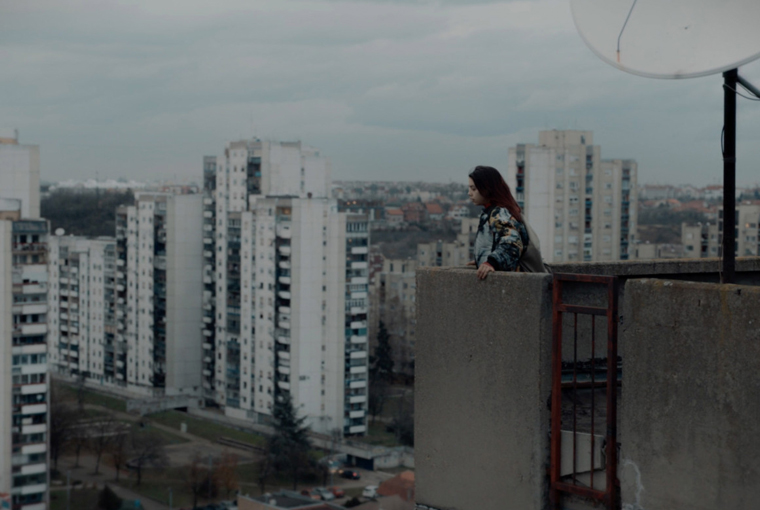A Girl and a Gun
Srdan Golubović and Ivan Knežević’s Absolute 100 (Apsolutnih 100, 2024)
Vol. 152 (February 2025) by Moritz Pfeifer
Set against the gray blocks of Belgrade, Absolute 100 reworks Srdan Golubović’s eponymous debut feature into a mini-series that taps into today’s appetite for female-led action. The six-part drama – created by Golubović and Ivan Knežević and co-directed by Golubović alongside Stefan Ivančić, Katarina Mutić, and Nikola Stojanović – opened in the Special Screenings section at the 59th Karlovy Vary International Film Festival. Here, nineteen-year-old Sonja (Anita Ognjanović), a junior national shooting champion, becomes both avenger and guardian when her war-veteran father Dragan (Boris Isaković) collapses under crippling debt and her brother Vuk (Miodrag Dragičević) is sucked into brutal criminal schemes. Sonja grabs her father’s old service rifle and turns the building’s dank stairwells into a proving ground. Ognjanović makes Sonja an unforgettable force whose presence carries the entire remake, yet even her performance can’t fully mask the story’s narrative flaws and familiar beats.
In its early scenes, the series zeroes in on patriarchal failure. Dragan is literally and figurately crippled and can no longer provide for the family. He fights weakness with machismo, joking that the liquidator visiting the apartment to assess the value of their few belongings must fancy him for coming so often. Sonja’s brother Vuk is stepping in his father’s footsteps, scraping together cash by running errands for Mili (Marko Grabež), the local kingpin’s heir, to stave off eviction. The more Vuk says, “I’ll sort things out”, the deeper he is driven into danger and farther from his little girl, who lives separated with her mother.
Social commentary sits at the series’ core, reminding the viewer that the men around Sonja are too broken or too blinkered to care for her. When her brother stumbles onto a crime scene, panic replaces his bravado and Sonja steps in. Anita Ognjanović carries Sonja’s transformation from girl-from-the-block to vigilante through a portrait of trauma. After she pulls the trigger on Mila, she drags herself into a night of loud celebration, swaying as if nothing has changed. When she returns to the range, her shots scatter. Small acts like her visit to a salon to die her hair, hint at a shift deeper than grief until, finally, she confesses the killing and lets tears fall. Ognjanović moves through denial, shame, solidarity, and release so naturally that the recoil bruise in her shoulder becomes its own language.
Still, the plot never frees Sonja from the men who define her. She grabs her father’s rifle, a relic of his battlefield valor, rather than forging her own weapon of choice. Her mother, a former sharpshooter, vanished for work in America, as if the series needed an easy absence to justify Sonja’s lone crusade. In the final act, patriarchy falls back into place: Dragan redeemed in sacrifice, Vuk relieved of his sins. Had the series let the detective’s (Muhamed Hadžović) empathy deepen into partnership, his questions and keen eye could have helped develop the series’ theme of female empowerment beyond the trope of the girl with a gun, which comes with its own set of male fantasies. When the detective realizes who the real killer is, however, his “Run!” reduces his earlier understanding to a patronizing swoop. These and other flaws in the script undermine the series’ early critique of male failure.
Despite a conventional finale, the series leaves its mark through performance. Ognjanović’s Sonja carries the show when the plot falls back on stock devices. She turns a story of uneven justice into a portrait of a family at its breaking point – and of a young woman who refuses to wait for someone else to draw first.




Leave a Comment